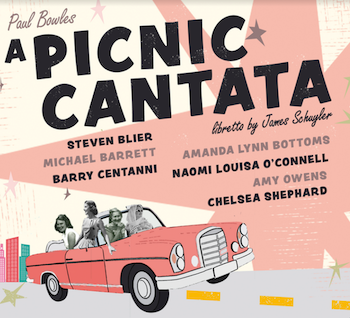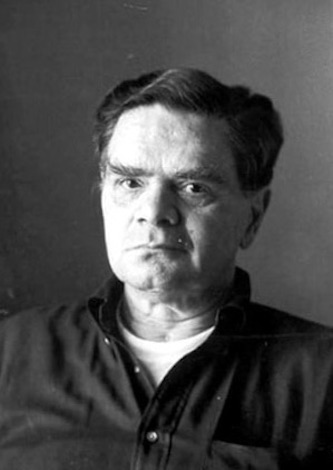Classical Music Album Review: Paul Bowles’s “A Picnic Cantata” — A Bittersweet Charmer
By Ralph P. Locke
Festival of American Song Records has released an elegant, touching performance of the totally delightful half-hour long Picnic Cantata.
Paul Bowles: A Picnic Contata
Amy Owens, Chelsea Shephard, sopranos; Amanda Lynn Bottoms, Naomi Louisa O’Connell, mezzos; Steven Blier, Michael Barrett, duo-pianists; Barry Centanni, percussion.
NYFOS Records 2022; 29 minutes.
 In these pages (so to speak), I hailed the first release from a new label, New York Festival of Song Records. That was a wide-ranging recital of American songs, performed by mezzo Stephanie Blythe, tenor William Burden, and pianist Steven Blier.
In these pages (so to speak), I hailed the first release from a new label, New York Festival of Song Records. That was a wide-ranging recital of American songs, performed by mezzo Stephanie Blythe, tenor William Burden, and pianist Steven Blier.
Here’s a very welcome follow-up: Paul Bowles’s A Picnic Cantata (1953). The work was once available on a mono Columbia LP, featuring the original performers: duo-pianists Arthur Gold and Robert Fizdale, percussionist Al Howard, and four immensely talented young female African-American singers, of whom Gloria Davy would later become particularly well known (singing leading roles at the Met and in European houses). The flip side of the disc was Gold and Fizdale alone, in the Poulenc Sonata for Two Pianos. The preference for Black singers may have been a pointed gesture in support of the Civil Rights Movement; it may equally well have been inspired by the marvelous 1947 recording of Virgil Thomson’s Four Saints in Three Acts, made with members of the all-Black cast from the premiere performances in 1934. (That 1947 recording was most recently rereleased on CD in 1996 and is available on the usual streaming services; it remains vitally communicative.)
The present CD follows upon several different performances of A Picnic Cantata that the New York Festival of Song has given over the past few decades, no doubt with a changing roster of singers. One performance reportedly occurred in Leonard Bernstein’s apartment, while the aged Bowles listened in by telephone from his longtime home in Tangiers, Morocco.
The work is a total delight: imaginative and touching by turns. It uses a libretto written for the purpose by James Schuyler, who was just starting out then but would achieve renown as one of the New York Poets (with John Ashbery and others). It’s a lazy Sunday in, presumably, New York City. Four friends go off in a car, reach a (fictitious) park, comment on the historical plaque about a freedom fighter (equally fictitious), watch some kites flying and suddenly plunging, exult in the succulent food they have brought, read aloud from the Sunday newspaper (specifically the gardening and advice columns, whose content seems evocative of their own individual concerns), pack up, express wistful regret that the fun is ending, and drive home, commenting on the stars in the sky and promising to gather again. The touches of sadness often seem unspoken, being hinted at by the two pianos in brief interludes when the singing ceases.
Paul Bowles (1910-99) was one of the most gifted and idiosyncratic creative figures in 20th-century America. He is best known today as a writer of somewhat gloomy fiction, most notably the 1949 novel The Sheltering Sky, set in Morocco. In 1990, director Bernardo Bertolucci turned it into a movie that has been widely touted and just as widely derided. (It starred Debra Winger and John Malkovich, and Bowles had a small on-screen role.) But this famed novelist also composed actively at various points in his life and was highly regarded by many. Partly self-taught, he studied at times with Aaron Copland, who was a close friend and supporter. He wrote numerous somewhat Poulenc-ian chamber works, as well as incidental music for some 20 plays, including famous ones by Tennessee Williams.

Author and composer Paul Bowles in 1966. Photo: Wiki Common
Schuyler’s text does not specify which of the four singers sings which lines, but Bowles has divided it up in such a way that we sense some specific traits of each of the four characters. Bowles was likely bisexual: over the course of his life, he was sexually involved with various men, yet he married novelist Jane Bowles (née Auer) and was devoted to her. The Bowleses were inveterate travelers, and Paul was fascinated by the local musics he encountered. He made an important series of commercially released recordings of the traditional musics of Morocco (recorded in 1959, now re-released on CD).
The composer at first set out to write this “cantata” (i.e., unstaged vocal work) for four male singers, but finally opted for four women. Whether you want to hear the four female characters (who are not named) as stand-ins for four men is up to you. Or they could be two lesbian couples. Or four individual female friends, each with her own mostly unspoken yearnings.
I mentioned the Poulenc-like style. Poulenc’s special blend of the tender and the giddy hangs over this 29-minute work, and, if you like the Frenchman’s Les Mamelles de Tirésias, as I do, you’ll be happy with this bittersweet charmer as well. There are also passages of motoric writing that resemble some moments in Prokofiev, as well as occasional bits that evoke, in response to images in the text, the blues and Indonesian gamelan.

Poet James Schuyler. Photo: Schuyler’s Species
Schuyler’s words are set clearly and naturalistically: the vocal lines avoid the extreme angularity that afflicts so many modern vocal works. The style is often bubbly, dance-like, or lilting, with a rippling accompaniment for the two pianos, who are further supported by a percussionist. If you’re putting on a concert of the Bartók Sonata for Two Pianos and Percussion, here’s a great piece to precede or follow it!
All of this is helped by a joyous and rueful (by turns) performance from duo-pianists Barrett and Blier, co-founders of the New York Festival of Song. Barry Centanni, principal percussionist of the Orchestra of St. Luke’s, adds zing to the atmosphere, and the four singers are totally at ease in their roles, with steady voices and with enunciation that makes the texts easy to grasp.
Still, I recommend downloading the libretto and reading it on its own to help you pick up more nuances of wording and sudden, revealing shifts of topic. The libretto displayed on my iPhone in a large, easy-to-read font. Steven Blier’s accompanying essay is insightful and splendidly detailed.
The singers were apparently chosen without regard to “race” (that inherently reductive category), as is also now the case with most if not all performances of Four Saints in Three Acts and, of course, most productions of operas. The modern stereo recording also helps greatly in a work full of quick repartee.
A Picnic Cantata has led me to listen to some other works by Bowles, and to wonder why they, too, don’t get performed more often. His works may at first come across as slight, but that’s true of many deceptively breezy works by such skillful and often-enchanting composers as Weill, Villa-Lobos, Germaine Tailleferre, and the aforementioned Poulenc (and Broadway composers such as Gershwin, Bernstein, and Sondheim). Many of these works (e.g., Tailleferre’s Sonata for Solo Harp, written the same year as Bowles’s Picnic Cantata) have proven more durable than certain grander and more intellectually impressive efforts that garner automatic respect from music critics and academics.
Ralph P. Locke is emeritus professor of musicology at the University of Rochester’s Eastman School of Music. Six of his articles have won the ASCAP-Deems Taylor Award for excellence in writing about music. His most recent two books are Musical Exoticism: Images and Reflections and Music and the Exotic from the Renaissance to Mozart (both Cambridge University Press). Both are now available in paperback; the second, also as an e-book. Ralph Locke also contributes to American Record Guide and to the online arts-magazines New York Arts, Opera Today, and The Boston Musical Intelligencer. His articles have appeared in major scholarly journals, in Oxford Music Online (Grove Dictionary), and in the program books of major opera houses, e.g., Santa Fe (New Mexico), Wexford (Ireland), Glyndebourne, Covent Garden, and the Bavarian State Opera (Munich).
Tagged: A Picnic Cantata, Festival of American Song Records, James Schuyler, Paul Bowles, Stephanie Blythe, Steven Blier
